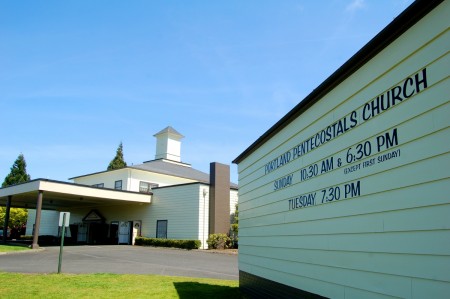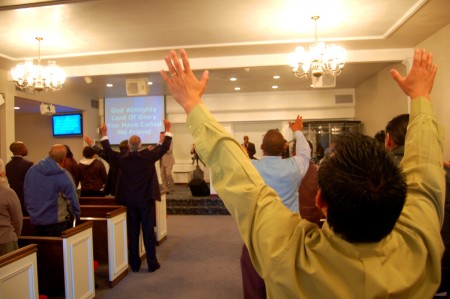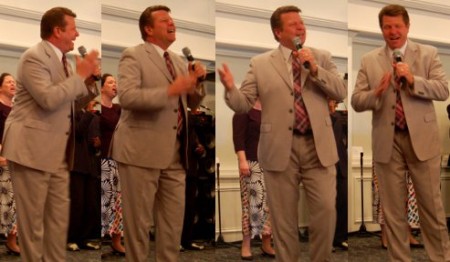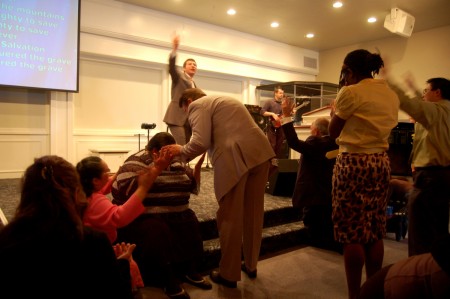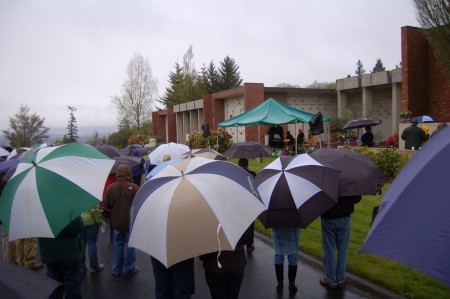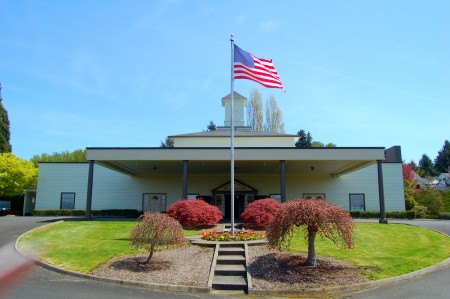I like to imagine that our blog readers are secretly jealous of us.
While you go about your humdrum lives, sleeping in on Sundays and lingering over brunch and the Sunday Times, we’re like Stanley and Livingstone in the Congo, rising before dawn to throw our half-asleep children in the car for another trek into the wild, dark interior of America’s churches.
Um, you are jealous, right?
Our project is nothing if not an exercise in cultural anthropology. This Sunday it took us to the far reaches of rational human behavior. I’m talking about our visit to the Portland Pentecostals church.
Ecstatic forms of worship enjoy a long tradition. From the Umbanda temples of Brazil to the Voodoo churches of Haiti and New Orleans to just anywhere else on the world map that you can hit with a dart, charismatic traditions can be found. Every major religion has produced a sect or two that practices speaking in tongues, faith healing and general carrying-on. Sure, it looks weird to me. How can it not look that way?
Amanda and I watched in amazed silence as the the crowd of 100 or so people lunged to its feet and for the next 40 minutes sang, or, more precisely, shouted a medley of Christian rock songs led by Senior Pastor and church founder Steve Hanson, his backup singers and a small band:
I am a friend of God!!
I am a friend of God!!
I am a friend of God
He calls me friend!!!
And:
I called, you answered
And you came to my rescue
And I, I wanna [sic] be where you are
Pastor Hanson looked sharp in his well-tailored taupe suit, starched shirt, plaid tie and televangelist hair. As he strutted and pranced about the stage, cajoling the throng to greater vocal participation, I had to admit that I was watching a man doing exactly what he was born to do: getting jiggy for Jesus. Another thing was clear: He loves the camera and the camera loves him.
Among all the swaying and the keening, the outstretched arms and the tears, there was one audience member who made my jaw drop: a young man, I’m guessing in his twenties, just off stage in a spiffy suit and close-cropped hair, wildly jumping and swaying as he sang, his face twisted into a rictus of spiritual ecstasy. Based on his age, reckless abandon and, most importantly, a certain look in his eye, I felt that something was deeply troubling this person.
I snickered in Amanda’s ear: “Chronic masturbator.”
“You would know.”
After 40 minutes of music, the audience began to falter. Some of the less hardy—the elderly and the teenagers—began quietly slumping into their seats. No surprise there: I was exhausted just watching them.
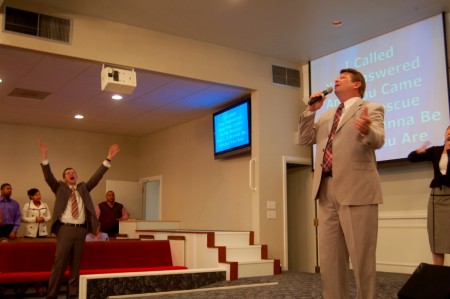
And then the young man we’d been laughing at took the stage. Holy hymnal! It was the pastor’s son, Youth Pastor Anthony Hanson. From the moment he stepped into the lights, he was a fire hose of frothy, frenzied, hysterical preaching. In the rapid-fire, don’t-stop-to-reload cadence and word whiskers of old timey tent preachers, he launched into his sermon, the title of which was: “The Stink Will Not Stop God.”
“Smells are a horrible thing-ah to have! I can’t-ah handle bad smells-ah! There’s not many people that can handle bad smells-ah! If I were looking to buy a house-ah and I walked into a house-ah and the smell was horrible and overpowering-ah, I would make a quick exit-ah! I would not return to that house-ah because there’s something about-ah horrible smells-ah that they just push me away and I would say, ‘I don’t want anything to do with that smell-ah!!’”
His point was-ah: our lives as sinners are like that stinky, smelly house. Fortunately, there’s a solution. Going full tilt, he rallied on, arms flailing, spittle flying:
“You see, God doesn’t mind the smell of your life-ah, he doesn’t mind the complications of your life-ah! Some of them, most of them are because of our own way of life-ah, they’re because of our sin and the destruction of our lives, but God in the midst of all that-ah does not turn his nose-ah and walk the other way-ah! God says, ‘I don’t mind that smell, I don’t mind that mess-ah!’”
“When people come to God, their lives are destroyed, they’re ravaged by sin-ah, alcohol and drugs and illicit relationships, and everything is torn apart and in shreds because it’s the end times, it’s the days before Jesus comes again-ah!”
“You look at your life and you think it’s a mess-ah! But God says, ‘I agree, but I can still work-ah in the midst of that-ah! Yeah, it smells-ah, but I don’t mind, because I’ve got a plan, I’ve got a promise, I’m gonna do something great in your life-ah!!’”
Anthony blared on like this for a full half hour until I feared he would soil his pants. Swear to God, he gave that entire sermon in a single breath. If nothing else, I had to admire his stamina. Maybe that’s why his father seldom preaches any more: this is a young man’s work. By age 50, this oratorical style would be hazardous to one’s health.
While Pastor Anthony was preaching, I looked over at Pastor Steve, seated in the front row, apparently following along on his electronic notepad. What was he thinking as he watched his son go berserk on stage? Was he proud? Professionally detached? Embarrassed? Afterward, did he take Anthony aside and say, “Good job, son?” Or perhaps he said, “That was a mighty spirited sermon you gave this morning, son, but, just a thought, eh, you might want to tone it down a little. I think you frightened some of the children.”
Ultimately, Portland Pentecostals is a family business. There’s Hanson the Elder, a spit-polished model of Southern Baptist ministeriality: smart, smooth and ruthless. And then there’s Hanson the Younger, emotionally volatile, a bit of a loose cannon, yelling himself hoarse on stage. I concluded that the fundamental difference between the two was that Steve Hanson knows something that Anthony doesn’t: that this style of preaching is 25 percent Jesus, 75 percent racketeering. Pastor Anthony Hanson, a wind-up toy of his father’s creation, wasn’t included in the joke.
“This altar is open right now-ah! If you’ve lost track of the problems, or if you’ve lost perspective of the problems of life, say, ‘God-ah, I’m givin’ it to you right now-ah, so that you can shout, ‘Lazarus-ah come forth!! God doesn’t mind the smell today, he doesn’t mind the smell of your life, he doesn’t mind the smell of your neighbor-ah, he’s just saying, ‘Ohhhh-ah, I can work,’ he’s just saying, ‘bring your problems to God, who’s able and willing to work, you’re not too far gone.’ I’m so grateful God that you don’t mind the stinkin’!!”
As Pastor Anthony’s sermon wound down, the music picked back up again. The lights were dimmed, giving full sway to the pandemonium of the full-on “gifts of the spirit.” People alone and in huddles of two or three fell to their knees and began moaning, crying and speaking in the gibberish of the charismatic gift of tongues. Others fell in front of the stage, kneeling as Pastor Steve laid his hands on them, casting out their demons and whatnot and (cough cough) healing the sick.
The crowd had been whipped into an ecstatic frenzy, hellbent, perhaps, on outdoing the antics of young Anthony on the stage.
It’s easy to dismiss these histrionics as appealing to our basest instincts. And, while that may be true, I think it’s a mistake to dismiss them. The message couldn’t be simpler: like naughty children who don’t yet know the difference between right and wrong, we can only be guided by the threat of hell or the promise of heaven. There’s a place for that. The Hansons’ ministry fills a role not unlike Twelve Step recovery programs whose success hinges on their members’ belief that their lives are out of control and that the only two choices are between the bliss of sobriety and the torture of relapse. Here are the first three of the Twelve Steps:
1. We admitted we were powerless over alcohol—that our lives had become unmanageable.
2. Came to believe that a Power greater than ourselves could restore us to sanity.
3. Made a decision to turn our will and our lives over to the care of God as we understood Him.
Anthony’s relentless patter drummed out one steady beat, mirroring the one above:
1. Your life stinks because your are a sinner.
2. But don’t feel bad because God can help you.
3. All you have to do is let Jesus into your heart.
So that’s the Pentecostals’ benefit to the community. They take people who may be operating on a low rung of self-awareness and give them a higher rung to focus on.
But here’s the rub. Such religions keep their members stuck on Step Three. Offering them a measure of relief from the troubles their “sin” has brought them, they take them no further. And why should they? To continue to raise their members beyond that to a point of true autonomy isn’t good for business. Plus, the ministers themselves are often no further down the road. And so, whether by design or because they don’t know better, they create dependency relationships between their flock and the church.
As I looked around at the gathered crowd on that Sunday, I saw people who were not exactly among the city’s wealthiest; many of them were immigrants from Latin American and African countries, with a few Russians mixed in for good measure. I’m guessing they were attracted to Portland Pentecostals because it resembles the churches they attended in their home countries.
They’ve found a spiritual home for now—a place where they can worship in a way that makes sense to them. I would hope that they continue to grow, eventually graduating from the hysteria of Portland Pentecostals.
At the end of the service, Amanda disappeared to hunt for her son, who had gone off to Sunday School. While I waited, I explored the lobby and observed the congregants as they dispersed. Though I’d driven by the church hundreds of times, it was as if I had stepped into an exotic foreign land. Eventually she reappeared with Alex in tow, and I have to say I was relieved.
I said, “Ms. Westmont, I presume?”
—–
Agree, disagree, or got stories of your own to share? Join the discussion and post your comments below!
